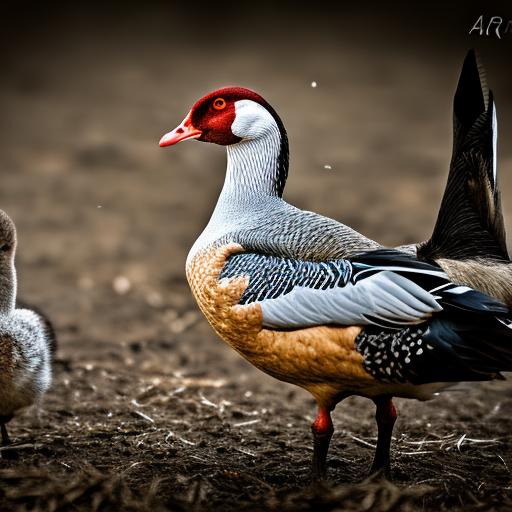Keeping geese and chickens together is a topic that often sparks curiosity and debate among poultry enthusiasts. While some people believe that geese and chickens can coexist peacefully, others are skeptical about their compatibility. In this article, we will explore the temperament and behavior of geese and chickens, the advantages and challenges of keeping them together, factors to consider before making this decision, housing requirements, feeding and nutrition needs, health concerns, and tips for keeping them together safely.
Key Takeaways
- Geese and chickens can coexist, but it requires careful planning and management.
- Understanding the temperament and behavior of both species is crucial for successful cohabitation.
- Keeping geese and chickens together can provide benefits such as pest control and increased egg production.
- Challenges include potential aggression and health concerns, as well as differing dietary needs.
- Factors to consider before keeping geese and chickens together include space, climate, and local regulations.
Understanding the Temperament and Behavior of Geese and Chickens
To understand whether geese and chickens can coexist, it is important to first understand their natural behavior. Geese are known for their protective nature and strong flock mentality. They are highly territorial birds that can become aggressive when they feel threatened or when their territory is invaded. Chickens, on the other hand, are generally more docile and social animals. They tend to establish a pecking order within their flock but are not as territorial as geese.
The behavior of geese and chickens can greatly affect their coexistence. If the geese perceive the chickens as a threat to their territory or flock, they may become aggressive towards them. This aggression can manifest in chasing, pecking, or even injuring the chickens. Additionally, geese have a tendency to graze on grass and can be quite destructive to gardens or landscaping if not properly managed. Chickens, on the other hand, may be intimidated by the size and assertiveness of geese, which can lead to stress or reduced egg production.
Advantages of Keeping Geese and Chickens Together
Despite the potential challenges, there are several advantages to keeping geese and chickens together. Firstly, geese are excellent guardians for chickens. Their protective nature makes them effective at warding off predators such as foxes or raccoons. Geese are known to be highly alert and will sound the alarm if they sense danger, giving the chickens time to seek shelter. This added layer of protection can greatly enhance the safety of the flock.
Secondly, geese and chickens can complement each other in terms of foraging. Geese are grazers and enjoy eating grass, while chickens are skilled at scratching and pecking for insects. By keeping them together, you can create a more balanced and efficient system of pest control and vegetation management. The geese can help keep the grass trimmed and prevent overgrowth, while the chickens can help control pests and insects in the area.
Lastly, geese and chickens can provide companionship for each other. Both species are social animals that thrive in the presence of others. By keeping them together, you are providing them with opportunities for social interaction and stimulation. This can lead to happier and healthier birds overall.
Challenges of Keeping Geese and Chickens Together
While there are advantages to keeping geese and chickens together, there are also potential challenges that may arise. One of the main challenges is aggression between the two species. As mentioned earlier, geese can become aggressive towards chickens if they perceive them as a threat or if their territory is invaded. This aggression can lead to injuries or even death among the chickens.
Another challenge is the potential for disease transmission. Geese and chickens can carry different diseases and parasites that may be harmful to each other. It is important to implement proper biosecurity measures to minimize the risk of disease transmission between the two species.
Additionally, geese have a tendency to graze on grass and can be quite destructive to gardens or landscaping if not properly managed. They may also trample on delicate plants or flowers, causing damage to your garden.
Factors to Consider Before Keeping Geese and Chickens Together
Before deciding to keep geese and chickens together, there are several factors that you should consider. Firstly, you need to assess the size of your property and the availability of space. Both geese and chickens require ample space to roam and forage. If your property is small or if you have limited space, it may not be suitable for keeping both species together.
Secondly, you need to consider the temperament of your geese and chickens. Some geese may be more aggressive than others, while some chicken breeds may be more timid or easily intimidated. It is important to choose breeds that are known to be compatible and have a similar temperament.
Another factor to consider is the availability of resources such as food and water. Geese and chickens have different dietary needs and it is important to ensure that they have access to a balanced diet. Additionally, you need to provide enough water sources for both species, as geese require more water for bathing and grooming.
Lastly, you need to consider the local regulations and zoning laws in your area. Some areas may have restrictions on keeping certain types of poultry or may require permits for keeping geese. It is important to familiarize yourself with these regulations before making a decision.
Housing Requirements for Geese and Chickens

When keeping geese and chickens together, it is important to provide them with appropriate housing that meets their specific needs. Both species require shelter from the elements, protection from predators, and enough space to move around comfortably.
For geese, a simple shelter or coop with a secure fence is usually sufficient. Geese are generally hardy birds that can tolerate a wide range of temperatures. However, they do require protection from extreme weather conditions such as excessive heat or cold. The shelter should be well-ventilated and provide enough space for the geese to move around comfortably.
Chickens, on the other hand, require a coop that provides protection from predators such as foxes or raccoons. The coop should be secure and have a solid floor to prevent predators from digging underneath. It should also have enough roosting space for the chickens to perch at night and enough nesting boxes for them to lay their eggs.
When housing geese and chickens together, it is important to provide separate areas for each species. This will help minimize aggression and allow each species to have their own space. Additionally, you should provide enough space for both species to move around comfortably and access to fresh air and natural light.
Feeding and Nutrition Needs of Geese and Chickens
Geese and chickens have different feeding and nutrition needs, so it is important to provide a balanced diet for both species. Geese are grazers and enjoy eating grass, so it is important to provide them with access to fresh pasture or a grazing area. They also require a diet that is high in fiber, so you can supplement their diet with hay or leafy greens.
Chickens, on the other hand, require a diet that is high in protein. They need a balanced feed that contains the necessary nutrients for egg production and overall health. You can supplement their diet with kitchen scraps or treats such as mealworms or fruits, but it is important to ensure that they are getting the necessary nutrients from their feed.
When feeding geese and chickens together, it is important to provide separate feeding areas for each species. This will help prevent competition for food and minimize aggression. Additionally, you should provide enough feeders and waterers to ensure that all birds have access to food and water at all times.
Health Concerns When Keeping Geese and Chickens Together
When keeping geese and chickens together, there are several health concerns that you should be aware of. Firstly, geese and chickens can carry different diseases and parasites that may be harmful to each other. It is important to implement proper biosecurity measures to minimize the risk of disease transmission between the two species. This includes regular cleaning and disinfection of their living areas, as well as quarantine procedures for new birds.
Secondly, geese and chickens have different nutritional needs, so it is important to ensure that they are getting a balanced diet. A deficiency in certain nutrients can lead to health issues such as poor egg production or weakened immune systems. It is important to provide a feed that is specifically formulated for each species and to monitor their health regularly.
Lastly, geese and chickens can be susceptible to external parasites such as mites or lice. Regular inspection and treatment for parasites is essential to keep your birds healthy. This includes checking for signs of infestation such as feather loss, skin irritation, or excessive scratching.
Tips for Keeping Geese and Chickens Together Safely
To ensure the safety and well-being of both geese and chickens when keeping them together, here are some practical tips:
1. Provide separate areas: As mentioned earlier, it is important to provide separate areas for geese and chickens to minimize aggression and allow each species to have their own space.
2. Monitor their behavior: Regularly observe the behavior of your geese and chickens to ensure that they are getting along. Look out for signs of aggression or stress, and take appropriate measures if necessary.
3. Implement proper biosecurity measures: To minimize the risk of disease transmission, implement proper biosecurity measures such as regular cleaning and disinfection of their living areas, as well as quarantine procedures for new birds.
4. Provide ample space: Ensure that both geese and chickens have enough space to move around comfortably. This will help reduce stress and minimize aggression.
5. Provide balanced nutrition: Provide a balanced diet that meets the specific nutritional needs of both geese and chickens. Monitor their health regularly and make adjustments to their diet if necessary.
6. Regularly inspect for parasites: Regularly inspect your birds for signs of external parasites such as mites or lice. Treat infestations promptly to prevent further spread.
Is Keeping Geese and Chickens Together Right for You?
In conclusion, keeping geese and chickens together can be a rewarding experience if done properly. While there are challenges and potential risks involved, the advantages of keeping them together, such as added protection, complementary foraging, and companionship, can outweigh the drawbacks. However, it is important to carefully consider the temperament and behavior of both species, as well as the factors discussed in this article, before making a decision. By providing appropriate housing, balanced nutrition, and implementing proper biosecurity measures, you can create a safe and harmonious environment for both geese and chickens.
If you’re considering keeping geese with chickens, it’s important to understand the dynamics and requirements of both species. While geese and chickens can coexist harmoniously, there are certain considerations to keep in mind. In a recent article by Poultry Wizard, they discuss the benefits and challenges of keeping geese and chickens together in the same coop. The article provides valuable insights on how to create a suitable living environment for both species, ensuring their safety and well-being. To learn more about this topic, check out the article on Poultry Wizard.
FAQs
What are the differences between geese and chickens?
Geese are larger and more aggressive than chickens. They are also more territorial and protective of their flock.
Can geese and chickens live together?
Yes, geese and chickens can live together, but it is important to introduce them slowly and monitor their interactions. Geese may bully or attack chickens, especially during mating season.
What are the benefits of keeping geese and chickens together?
Geese and chickens can provide companionship for each other and help protect each other from predators. Geese can also help keep the area clean by eating insects and weeds.
What are the drawbacks of keeping geese and chickens together?
Geese can be aggressive towards chickens and may harm or kill them. They also require more space and water than chickens, and their droppings are larger and messier.
How should geese and chickens be introduced?
Geese and chickens should be introduced slowly and in a neutral area. It is important to supervise their interactions and separate them if necessary. Providing separate food and water sources can also help prevent conflicts.
What should be considered before keeping geese and chickens together?
Before keeping geese and chickens together, it is important to consider the space available, the temperament of the birds, and the potential for conflicts. It is also important to check local regulations and zoning laws regarding keeping poultry.
Meet Walter, the feathered-friend fanatic of Florida! Nestled in the sunshine state, Walter struts through life with his feathered companions, clucking his way to happiness. With a coop that’s fancier than a five-star hotel, he’s the Don Juan of the chicken world. When he’s not teaching his hens to do the cha-cha, you’ll find him in a heated debate with his prized rooster, Sir Clucks-a-Lot. Walter’s poultry passion is no yolk; he’s the sunny-side-up guy you never knew you needed in your flock of friends!







